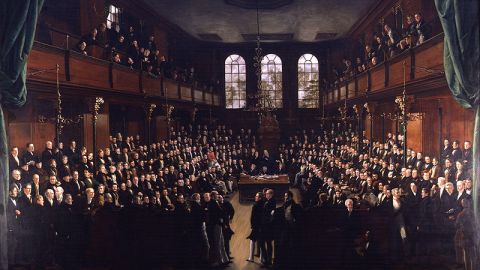The Temporal Democracy of Self-Slices

Via Dangerous Intersection, I saw this TED lecture by Daniel Kahnemann, based on his book Thinking Fast and Slow, about the conflict between the “experiencing self” and the “remembering self”. His thesis is that we have countless moment-to-moment experiences, most of which quickly fade from memory and leave no trace, while a few significant ones are retained and used to construct an overarching story or narrative of one’s life. According to Kahnemann, many experiences which were unpleasant or painful at the time may ultimately come to be viewed as positive or meaningful in the larger context, and this makes it impossible to define “happiness” in any consistent way over the course of a lifetime.
Since my moral system, universal utilitarianism, is based on what produces the greatest happiness, this would be a big problem for me if he were right. I’ve never held that happiness can be rigorously quantified, but we do have to have some way to talk about the relative value of different experiences to judge which ends we should pursue. If happiness were a meaningless or undefinable concept, it couldn’t be the basis of a moral philosophy.
However, this isn’t nearly as difficult or as serious a problem as Kahnemann makes it seem. His argument is phrased to sound as shocking and counterintuitive as possible, as if he had discovered two separate people inside you fighting it out for dominance. In fact, all he’s really doing is restating a very old and familiar phenomenon, which is the problem of self-control. Any act that requires self-control, by definition, is one that involves a tradeoff between present and future happiness: it’s unpleasant at the time, but brings greater benefits later on.
It’s like going to the gym. I hate having to go to the gym! It’s hard work to push myself, it’s exhausting and often painful, it takes up time I’d rather use for other things. But I feel good when I finish a workout, and in the long run, I know it will benefit me by allowing me to live a longer and healthier life than otherwise. By Kahnemann’s reasoning, this would be an irresolvable conflict. But it can be simply and rationally explained, in utilitarian terms, by saying that I willingly pay a temporary cost in return for a larger expected payoff.
Because our views, preferences, ideas and desires inevitably change over time, the existence-across-time that I call “myself” isn’t a unitary, eternal and changeless individual. It’s more like a chain of people, each one very similar to the ones before and after him, somewhat more different from the ones that are further away, although there are probably some major commonalities that last over a significant portion of my life.
Imagine that you could cut that temporally extended existence into “slices”, where each slice represents a complete snapshot of your personality at a given moment in time. When I’m making a tough decision, I like to think of it as a democracy of self-slices, where each one who’s positioned at or after a decision point gets a vote on what I decide. Granted, this is a somewhat fluid concept, because future self-slices can be brought into existence or canceled out of existence depending on what I decide in the present moment. But barring completely unforeseeable consequences, any ordinary person can come up with an estimation of how-things-would-have-otherwise-been, and use this to make decisions based on what offers the greatest expected value.
The same is true of Kahnemann’s examples, one of a colonoscopy (a slightly longer painful experience with less pain at the end is remembered as more tolerable than a shorter one with a sharp peak of pain at the end), and one of a vacation (a two-week vacation is more pleasure at the time than a one-week vacation, but doesn’t yield greater happiness in the long term). All these examples are saying, in effect, that we make the tradeoff that best optimizes pleasurable memories for all the self-slices that follow, even if it results in slightly less pleasure for our present self-slice.
Of course, lacking access to a time machine, we can’t actually consult our future selves. Self-control, then, is the next best thing: the ability to reason from the timeless perspective – to lift myself out of the moment, as much as humanly possible, and to judge how a course of action will affect me at future points in my life. Because of its invocation of potential happiness and suffering, UU values the future consequences of your actions, as well as their immediate impact in the present – and this is true within individuals as well as between them.
Image credit: Wikimedia Commons





